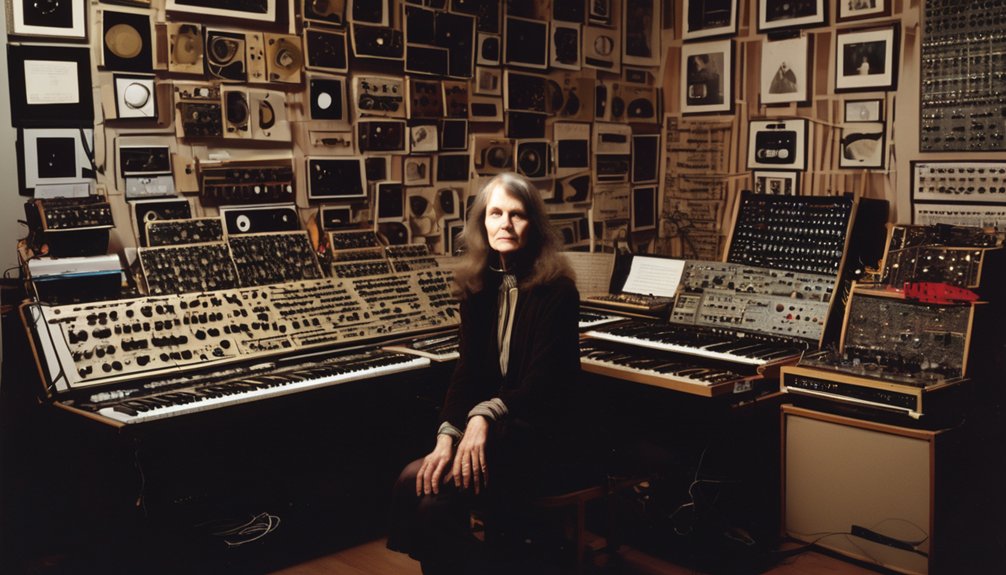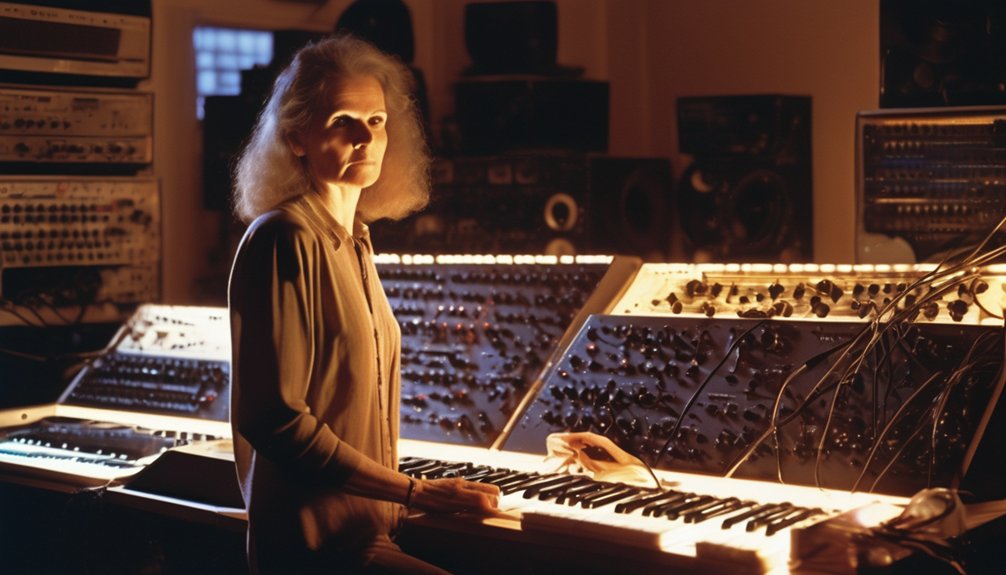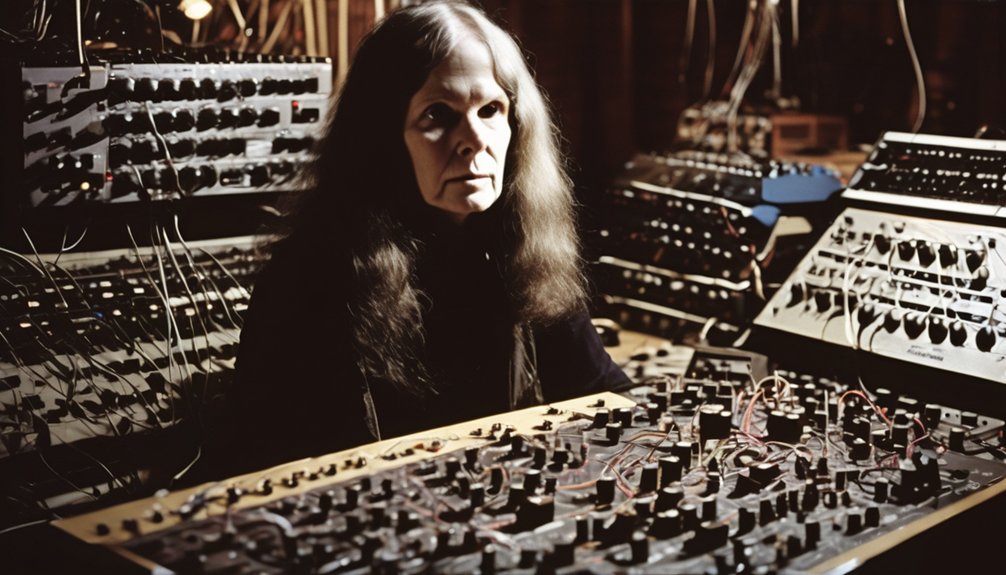The Extraordinary Trans Life and Music of Wendy Carlos


Table of Contents
ToggleLike a modern-day Orpheus, Wendy Carlos ventured into the domain of sound, forever altering the musical landscape. Her groundbreaking album “Switched-On Bach” not only popularized the Moog synthesizer but also challenged traditional boundaries of classical music. As you investigate her odyssey, consider how her personal evolution intertwined with her artistic innovations, influencing generations of musicians. What drives an artist to redefine not just music, but the very essence of identity itself?
Wendy Carlos, born Walter Carlos in 1939, showcases how early life experiences can profoundly shape one’s artistic voyage. Growing up in Pawtucket, Rhode Island, her parents nurtured her musical talent by providing a makeshift keyboard, igniting her passion for music. By the time she was 14, she’d earned a scholarship to build a computer, blending her musical and technical abilities. At Brown University, she studied both music and physics, later graduating from Columbia University with a master’s in music composition. Collaborating with electronic music pioneers like Vladimir Ussachevsky and Otto Luening further honed her creative approach. This foundation allowed Carlos to adapt classical music for synthesizers, paving the way for her future contributions to electronic music, setting her apart as a visionary artist.

Although many artists have attempted to reinterpret classical works, few have achieved the groundbreaking impact of “Switched-On Bach.” Released in 1968, this album not only showcased Wendy Carlos‘s inventive synthesizer arrangements of Johann Sebastian Bach’s compositions but also revolutionized the perception of electronic music. Using the Moog synthesizer, Carlos crafted arrangements that captivated a diverse audience, particularly with the Brandenburg Concerto No. 3, which dominated Billboard’s Classical Music chart for three years. The meticulous tape editing techniques demonstrated her technical prowess, earning “Switched-On Bach” three Grammy Awards and selling over a million copies in the U.S. This album didn’t just enhance ambient music; it cemented the Moog as a legitimate instrument, paralleling the cultural impact of The Beatles’ “Sgt. Pepper’s.”

Building on the groundbreaking foundation laid by “Switched-On Bach,” Carlos continued to shape the landscape of electronic music through her collaborations and unique sound explorations. Partnering with Robert Moog, she contributed to the Moog Synthesizer‘s cutting-edge features, like portamento control, enhancing its capabilities. Her score for Stanley Kubrick’s “A Clockwork Orange” exemplified how her synthesizer expertise created a distinctive soundscape that deepened the film’s themes. With “Sonic Seasonings,” Carlos released one of the initial ambient music albums, blending synthesized and natural sounds to evoke emotions. The 1982 soundtrack for Disney’s “TRON” showcased her ability to fuse digital and analog technologies, while “Digital Moonscapes” marked a pivotal moment as the premier album to exclusively use digital synthesizers, underscoring her pioneering spirit.
As Carlos navigated her career in the male-dominated world of music, her expedition toward self-acceptance and gender transformation became a significant narrative intertwined with her artistic identity. Born Walter Carlos, she faced gender dysphoria from a young period, ultimately changing in May 1972. Living in seclusion, she grappled with public life while maintaining her male persona. The 1979 Playboy interview marked a pivotal moment, but its focus on her change overshadowed her music, which she viewed as a betrayal. Her personal voyage reveals struggles against societal attitudes toward gender change, reflecting the challenges many face in seeking acceptance.
| Year | Event | Impact |
|---|---|---|
| 1939 | Born Walter Carlos | Early experiences of gender dysphoria |
| 1972 | Gender change | Significant personal milestone |
| 1979 | Playboy interview | Public acknowledgment, media focus |
| Regret | Years in secrecy | Limited public acceptance |
Wendy Carlos’s legacy in music is nothing short of transformative, as her groundbreaking work with the Moog synthesizer not only popularized electronic music but also redefined the boundaries of classical composition. Her influence resonates through diverse genres, showcasing her artistry’s breadth.
Wendy Carlos transformed music through her pioneering use of the Moog synthesizer, reshaping electronic and classical landscapes alike.
Her profound impact continues to inspire and empower future generations of musicians.
Wendy Carlos isn’t on Spotify because she prioritizes artist rights and control over her music. In an era when music streaming dominates, her decision reflects a commitment to quality and proper licensing. By limiting digital distribution, she combats unauthorized sharing and piracy, ensuring fans access her work through alternative means. While industry trends lean toward convenience, Carlos’s approach highlights the importance of preserving audio quality and respecting an artist’s intent in the digital era.
Wendy Carlos is essential for her groundbreaking compositions in electronic music that transformed how we perceive sound. Her creative use of the synthesizer not only reshaped classical music but also influenced film soundtracks, particularly with Stanley Kubrick. Beyond her musical achievements, she challenged gender identity norms, making a substantial cultural impact. Carlos’s artistic vision continues to inspire musicians, proving that the boundaries of creativity can be pushed in profound ways.
Yes, Wendy Carlos did wear sideburns during her early public performances. These sideburns were significant in shaping her appearance, reflecting her personal style and artistic choices. They helped her navigate her musician identity and gender expression at a time when societal pressures loomed large. While some might dismiss them as mere disguises, they represented a deeper struggle for authenticity, making her iconic looks not just a fashion statement but a powerful statement of resilience.
No, you can’t say Wendy Carlos invented the Moog synthesizer. That credit goes to Robert Moog, but Carlos notably influenced its history. Through her sound experimentation techniques and artistic vision, she showcased the synthesizer’s potential in “Switched-On Bach.” Her musical collaborations led to innovations like portamento control, enhancing early synthesizer designs. Carlos’s work helped shape electronic music development, making the Moog a staple in mainstream music and inspiring future generations of artists.
Wendy Carlos’s life and music challenge us to rethink boundaries—both in art and identity. Her groundbreaking work with the Moog synthesizer not only redefined classical music but also paved the way for future generations of musicians. As you reflect on her path, consider this: how many artists have the courage to transform themselves while transforming an entire genre? Carlos’s legacy continues to resonate, inspiring a world where innovation and authenticity thrive in harmony.
 Featured PostsNovember 5, 2025Changing Bodies, Changing Desires: Sex Identity in Transition
Featured PostsNovember 5, 2025Changing Bodies, Changing Desires: Sex Identity in Transition Featured PostsNovember 4, 2025Passing Tips Every Trans Girl Should Know
Featured PostsNovember 4, 2025Passing Tips Every Trans Girl Should Know Featured PostsNovember 4, 2025Trans 101: The Facts Everyone Should Know
Featured PostsNovember 4, 2025Trans 101: The Facts Everyone Should Know Featured PostsNovember 4, 2025Beyond the Basics: An In-Depth Preparation Roadmap for Your Facial Feminization Surgery Consultation
Featured PostsNovember 4, 2025Beyond the Basics: An In-Depth Preparation Roadmap for Your Facial Feminization Surgery Consultation